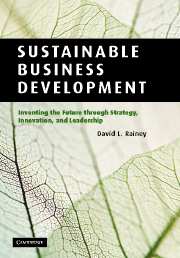Book contents
- Frontmatter
- Contents
- List of figures
- List of tables
- List of boxes
- List of abbreviations
- Acknowledgments
- Introduction
- Part I Enterprise thinking, the driving forces of change, and leadership
- 1 Sustainable business development: overview and guiding principles
- 2 Enterprise thinking and the strategic logic of strategic business development
- 3 Crafting sustainable business strategies and solutions
- 4 The driving forces of social-, economic-, and environmental-related change
- 5 The driving forces of markets and stakeholders' connectedness
- 6 Crafting a sustainable enterprise through leadership and capabilities
- Part II Innovation management, life cycle considerations, and insights
- Glossary
- Select bibliography
- Index
- References
4 - The driving forces of social-, economic-, and environmental-related change
from Part I - Enterprise thinking, the driving forces of change, and leadership
Published online by Cambridge University Press: 04 December 2009
- Frontmatter
- Contents
- List of figures
- List of tables
- List of boxes
- List of abbreviations
- Acknowledgments
- Introduction
- Part I Enterprise thinking, the driving forces of change, and leadership
- 1 Sustainable business development: overview and guiding principles
- 2 Enterprise thinking and the strategic logic of strategic business development
- 3 Crafting sustainable business strategies and solutions
- 4 The driving forces of social-, economic-, and environmental-related change
- 5 The driving forces of markets and stakeholders' connectedness
- 6 Crafting a sustainable enterprise through leadership and capabilities
- Part II Innovation management, life cycle considerations, and insights
- Glossary
- Select bibliography
- Index
- References
Summary
Introduction
SBD takes place within the context of the business environment. That context consists of social, economic, environmental, and business-related considerations and circumstances, and the ways in which those circumstances are changing. This chapter discusses how this dynamic environment can provide opportunities for corporations to develop, build, and enhance external relationships and create value – and, ultimately, enhance corporate wealth, reputation, and image. The primary focus is on how the corporation affects people and the natural environment as it conducts its affairs, designs, produces and sells products, operates its facilities, and acquires and uses the resources necessary to satisfy customers, stakeholders, and other constituents.
By building key stakeholder relationships among government agencies, NGOs, consumer entities, environmental groups, and other constituents, corporations can anticipate and manage issues and concerns that might otherwise have gone undetected until they had grown into major problems. Being in sync with constituencies and building trust among customers and stakeholders is essential to building strategies for SBD.
The social considerations are the most crucial, yet the most difficult, to define and understand. The concept of corporate social responsibility goes back to pre-strategic planning days (the 1960s and 1970s). Generally, social considerations focus on specific issues that relate to the corporation's involvement in its direct affairs, such as activities and transactions with employees, customers, shareholders, suppliers, etc. Some of the most common concerns are those covered by laws and regulations, including sexual harassment, smoking in the work place, drug abuse, employee layoffs, diversity, and “right to know” mandates.
- Type
- Chapter
- Information
- Sustainable Business DevelopmentInventing the Future Through Strategy, Innovation, and Leadership, pp. 213 - 269Publisher: Cambridge University PressPrint publication year: 2006



